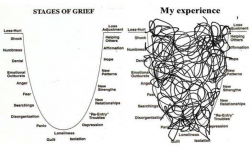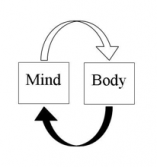Adjusting to Change as a result of a Neurological Condition
The information contained here is not intended to replace medical advice, and if you feel like your difficulties are obstructing your rehabilitation or impacting upon your day-to-day life, you should speak to a medical professional.
Information on this topic
When someone experiences a neurological condition, they may experience a whole range of feelings as they come to terms with the changes this brings. These can include feelings of loss. Loss can be defined as “the fact or process of losing something”.
Changes they may be trying to come to terms with might include:
- Changes in the ability to do something they used to be able to do. May lead to a loss of independence.
- Change of lifestyle
- Changes in roles/ relationships.
- Changes in self-image and sense of who they are.
- Adjusting to altered hopes and plans for the future.
Some of the common stages someone may go through when we experience these changes as a loss include:
- Denial: Helps to protect us from impact the change has/ might have.
- Anger: Placing blame on something/ someone else. “Why me?”
- Bargaining: Considering what could have changed what has happened.
- Depression: Period of sadness after realising what has
- been lost.
- Acceptance: recognising that many parts of you will be the same, such as values and personality, and learning to work around what has altered or been lost
However, it is important to remember that grief and adjustment is unique to each person and someone can move around these stages in any order, repeating stages and missing out stages.
Self Quiz
If you find that you experience some of the following common emotions/ thoughts/ symptoms, or something similar, then our self-help top-tips and activity may help you cope in day to day life.
Feeling down, having crying spells
Feelings of hopelessness/ being worthless, perhaps wondering whether life is worth living
Feeling irritable
Sleeping and/ or eating too much or too little
Not enjoying things like before
Keep yourself to yourself
Can’t stop worrying about problems or the future
“It had been a mistake, someone else's scans had been mixed up with mine”
“Why me? Why has it happened to me? Why is my life ruined?”
“My life will never be the same again, I would give anything to be normal again”
Top Tips
There is no right way adjust to a change in life – it is vital you work through your adjustment in your own way, at your own pace. But we have put together some tips that may help you manage in day to day life.
- Write your feelings in a journal, or type them on the notes in your phone.
- You don’t need to have to “keep it all together”. Showing your true feelings can help others and you. Ignoring them will make it worse in the long run.
- Try to live one day, or even one moment at a time – this can help to stop you becoming overwhelmed. Mindfulness can help with this.
- Don’t let anyone tell you how to feel, and don’t tell yourself how to feel either. Your grief and adjustment is your own, and no-one else can tell you when it is time to “move on”, or “get over it.”
- Focus on your successes, strengths, and support e.g. look at what you can do instead of what you can’t.
- Look after your physical health where you can - the mind and body are connected. When you feel healthier physically, you’ll be better able to cope emotionally.
- Talk to others for support, spend time with people who care about you. See if there is a support group you can join – meeting and talking with others in a similar position can help you to see you are not alone.
Self Help Activities
This template can be used to separate out our thoughts, feelings, behaviours and physical symptoms towards change, and we can see where there might be links between these to help us understand how we are feeling.
There is an example for you to look at, but it is specific to each individual.
Use this template to reflect on what you have previously tried, what barriers you face/ have faced, and plan your next steps.




